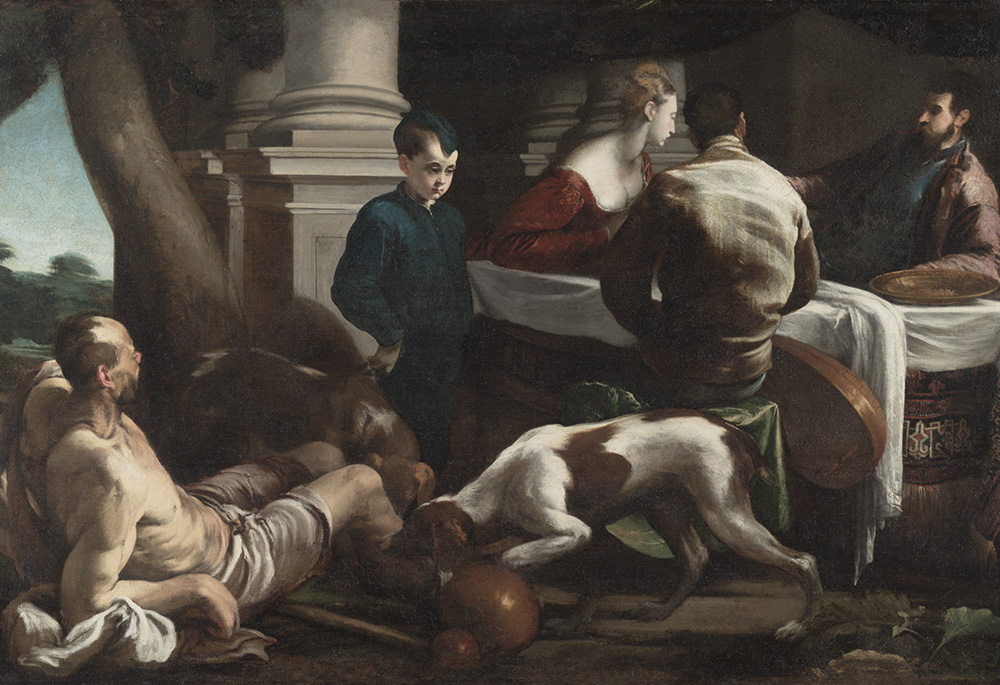
"Lazarus and the Rich Man," oil painting by Jacopo Bassano, circa 1550 (Cleveland Museum of Art)
Once, Jesus told a parable about a rich man and Lazarus, the only person ever named in Jesus' parables. He told it to shake up his audience. Today, we're his audience.
Luke recounts this parable with shrewd social geography. The rich man, enmeshed in his wine and finery, dwelt on the secure side of a door and routines that prevented him from noticing outsiders. Lazarus, whose name means "God will help," dwelt outside the entrance.
Surrounded by dogs and described as if his wounds were his attire, Lazarus appeared as the stark opposite of the inner circle's lavish luxury. When the two of them die, as everyone does, the story turns inside out. Angels fly to carry Lazarus to the bosom of Abraham. The rich man died, was buried, and found himself in "Hades," the obscure habitation named for the Greek god of the underworld and wealth. Death effectively disrobed the rich man of everything that had given him identity.
From his place among the nameless dead, the once-wealthy man sees Lazarus glorying in Abraham's embrace. In life, even though he almost had to step over him to enter his mansion, the rich man hadn't noticed Lazarus. When Lazarus had become untouchable, the rich man finally saw him and even learned his name. Undoing that tiny step toward esteeming the existence of another, he revealed that he remained completely self-absorbed: "Father Abraham! See how I suffer! Order that beggar to help me!" When Abraham explained that it was impossible, the man continued exposing the miniscule size of his circle of concern: He cared only about his siblings. Abraham explained the tragic truth that if people remained deaf to Moses and the prophets, not even someone who rose from the dead could displace them from being the center of their carefully cultivated and tiny universe.
As we have seen, Luke's Gospel becomes more pointed as Jesus travels toward the culmination of his ministry in Jerusalem, and his emphasis on serving the poor continues to grow along with the cost of discipleship. Charles Dickens (who left school at the age of 12 when his father was put in debtors' prison) illustrated Jesus' values for the 19th century with a more hopeful version of this parable in his classic, A Christmas Carol. Dickens introduces Scrooge as a miser who believed that poor people were an unnecessary bother, unworthy of serious consideration. Happily, a ghost leads Scrooge through a review of his past, offering him a last-ditch opportunity to create a different present and a future in which he could put his "mammon" to good use. All the world cheers each December as the converted Scrooge celebrates Christmas with the family he had disparaged.
Unfortunately, we can't count on ghosts to appear when people like us become blinded by wealth and its accoutrements. We have to discern what this Gospel suggests to us today on the personal and global level.
Advertisement
We should remember that the wealthy man in Jesus' story was not responsible for Lazarus' poverty. Similarly, few of us have consciously added to the impoverishment of migrants, refugees or street people. It would be hard to find any among us who effectively promoted the aggression against Ukraine. But Jesus' parable had nothing to do with causes. He was talking about people who fail to respond to others' suffering and need.
When Jesus gave Lazarus a name, he acknowledged his unique, personal dignity, a prelude to describing how Abraham lavished him with respectful tenderness. The wealthy man remained anonymous, allowing himself to be defined by position and possessions rather than relationships. Unlike the crafty servant of last week's parable, he failed to discover the potential of his wealth; he could only watch it become worthless in the face of death.
Jesus the partygoer never critiqued festivity nor did he ignore people's suffering. Perhaps the circumstances of his birth attuned him to outsiders, forging in him an awareness of who was left out, who attended to them, and how wildly enjoyable it can be when unexpected participants (be they shepherds or beggars) spice up a celebration. Jesus is not hawking tickets for guilt trips, but trying to entice us into the stretching adventures that were his specialty.
It's one thing to care about the poor and even donate for them — that goes a step beyond the rich man's blindness. But prayers and donations don't free us from being trapped among the insiders. One of the parable's suggestions is obvious: our time is far more limited than our resources. This is our moment to meet and greet the "other," the migrant, the beggar and whoever will enlarge our circle of concern. Learning each other's names is the next step in a journey headed toward enjoying the bosom of Abraham together.
[St. Joseph Sr. Mary M. McGlone serves on the congregational leadership team of the Sisters of St. Joseph of Carondelet.]
